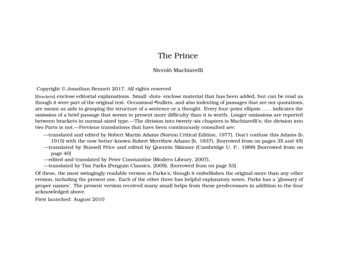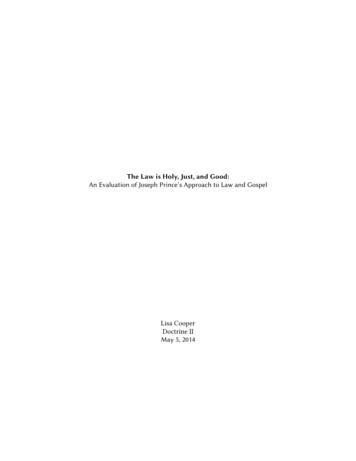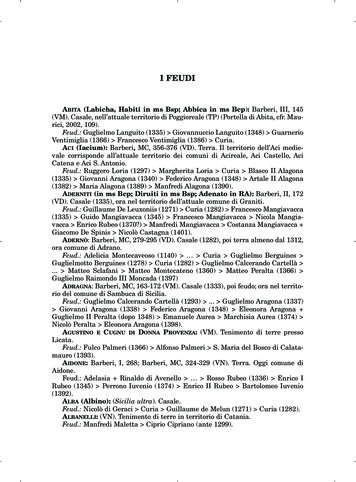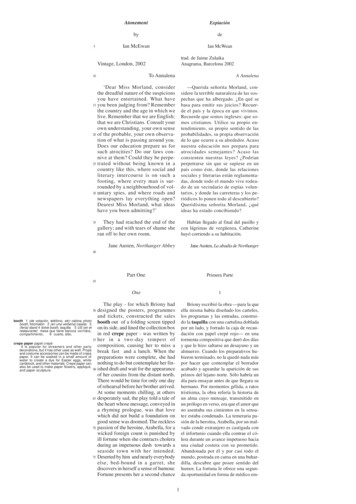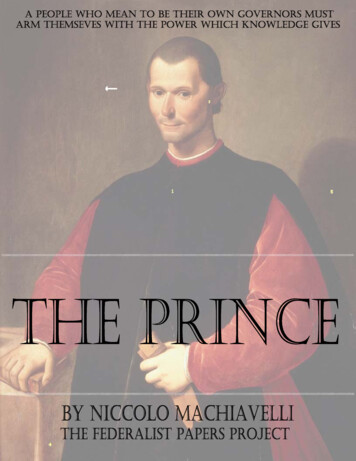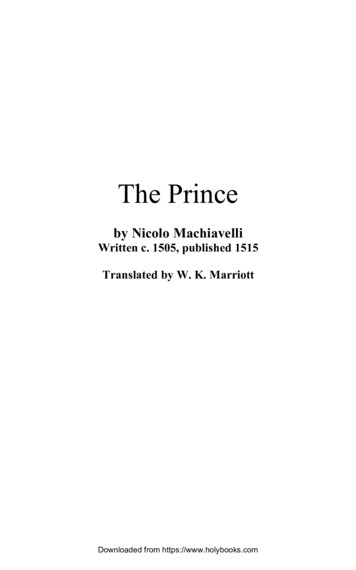
Transcription
The Princeby Nicolo MachiavelliWritten c. 1505, published 1515Translated by W. K. MarriottDownloaded from https://www.holybooks.com
The Prince1Nicolo MachiavelliCHAPTER IHow Many Kinds Of Principalities ThereAre, And By What Means They AreAcquiredALL STATES,all powers, that have held andhold rule over men have been and areeither republics or principalities.Principalities are either hereditary, in which thefamily has been long established; or they are new.The new are either entirely new, as was Milan toFrancesco Sforza, or they are, as it were, membersannexed to the hereditary state of the prince whohas acquired them, as was the kingdom of Naplesto that of the King of Spain.Such dominions thus acquired are eitheraccustomed to live under a prince, or to live infreedom; and are acquired either by the arms of theprince himself, or of others, or else by fortune orby ability.Downloaded from https://www.holybooks.com
The Prince2Nicolo MachiavelliCHAPTER IIConcerning Hereditary PrincipalitiesIWILL leave out all discussion on republics,inasmuch as in another place I have written ofthem at length, 1 and will address myself onlyto principalities. In doing so I will keep to theorder indicated above, and discuss how suchprincipalities are to be ruled and preserved.I say at once there are fewer difficulties inholding hereditary states, and those longaccustomed to the family of their prince, than newones; for it is sufficient only not to transgress thecustoms of his ancestors, and to deal prudentlywith circumstances as they arise, for a prince ofaverage powers to maintain himself in his state,unless he be deprived of it by some extraordinaryand excessive force; and if he should be sodeprived of it, whenever anything sinister happensto the usurper, he will regain it.We have in Italy, for example, the Duke ofFerrara, who could not have withstood the attacksof the Venetians in '84, nor those of Pope Julius in'10, unless he had been long established in hisdominions. For the hereditary prince has less causeand less necessity to offend; hence it happens thathe will be more loved; and unless extraordinaryvices cause him to be hated, it is reasonable to1 Discourses.Downloaded from https://www.holybooks.com
The Prince3Nicolo Machiavelliexpect that his subjects will be naturally welldisposed towards him; and in the antiquity andduration of his rule the memories and motives thatmake for change are lost, for one change alwaysleaves the toothing for another.Downloaded from https://www.holybooks.com
The Prince4Nicolo MachiavelliCHAPTER IIIConcerning Mixed PrincipalitiesBthe difficulties occur in a newprincipality. And firstly, if it be notentirely new, but is, as it were, a memberof a state which, taken collectively, may be calledcomposite, the changes arise chiefly from aninherent difficulty which there is in all newprincipalities; for men change their rulerswillingly, hoping to better themselves, and thishope induces them to take up arms against himwho rules: wherein they are deceived, because theyafterwards find by experience they have gone frombad to worse. This follows also on another naturaland common necessity, which always causes a newprince to burden those who have submitted to himwith his soldiery and with infinite other hardshipswhich he must put upon his new acquisition.In this way you have enemies in all those whomyou have injured in seizing that principality, andyou are not able to keep those friends who put youthere because of your not being able to satisfy themin the way they expected, and you cannot takestrong measures against them, feeling bound tothem. For, although one may be very strong inarmed forces, yet in entering a province one hasalways need of the goodwill of the natives.For these reasons Louis XII, King of France,UTDownloaded from https://www.holybooks.com
The Prince5Nicolo Machiavelliquickly occupied Milan, and as quickly lost it; andto turn him out the first time it only neededLodovico's own forces; because those who hadopened the gates to him, finding themselvesdeceived in their hopes of future benefit, would notendure the ill-treatment of the new prince. It isvery true that, after acquiring rebellious provincesa second time, they are not so lightly lostafterwards, because the prince, with littlereluctance, takes the opportunity of the rebellion topunish the delinquents, to clear out the suspects,and to strengthen himself in the weakest places.Thus to cause France to lose Milan the first time itwas enough for the Duke Lodovico to raiseinsurrections on the borders; but to cause him tolose it a second time it was necessary to bring thewhole world against him, and that his armiesshould be defeated and driven out of Italy; whichfollowed from the causes above mentioned.Nevertheless Milan was taken from France boththe first and the second time. The general reasonsfor the first have been discussed; it remains toname those for the second, and to see whatresources he had, and what any one in his situationwould have had for maintaining himself moresecurely in his acquisition than did the King ofFrance.Now I say that those dominions which, whenacquired, are added to an ancient state by him whoacquires them, are either of the same country andlanguage, or they are not. When they are, it isDownloaded from https://www.holybooks.com
The Prince6Nicolo Machiavellieasier to hold them, especially when they have notbeen accustomed to self-government; and to holdthem securely it is enough to have destroyed thefamily of the prince who was ruling them; becausethe two peoples, preserving in other things the oldconditions, and not being unlike in customs, willlive quietly together, as one has seen in Brittany,Burgundy, Gascony, and Normandy, which havebeen bound to France for so long a time: and,although there may be some difference inlanguage, nevertheless the customs are alike, andthe people will easily be able to get on amongstthemselves. He who has annexed them, if hewishes to hold them, has only to bear in mind twoconsiderations: the one, that the family of theirformer lord is extinguished; the other, that neithertheir laws nor their taxes are altered, so that in avery short time they will become entirely one bodywith the old principality.But when states are acquired in a countrydiffering in language, customs, or laws, there aredifficulties, and good fortune and great energy areneeded to hold them, and one of the greatest andmost real helps would be that he who has acquiredthem should go and reside there. This would makehis position more secure and durable, as it hasmade that of the Turk in Greece, who,notwithstanding all the other measures taken byhim for holding that state, if he had not settledthere, would not have been able to keep it.Because, if one is on the spot, disorders are seen asDownloaded from https://www.holybooks.com
The Prince7Nicolo Machiavellithey spring up, and one can quickly remedy them;but if one is not at hand, they heard of only whenthey are one can no longer remedy them. Besidesthis, the country is not pillaged by your officials;the subjects are satisfied by prompt recourse to theprince; thus, wishing to be good, they have morecause to love him, and wishing to be otherwise, tofear him. He who would attack that state from theoutside must have the utmost caution; as long asthe prince resides there it can only be wrested fromhim with the greatest difficulty.The other and better course is to send coloniesto one or two places, which may be as keys to thatstate, for it necessary either to do this or else tokeep there a great number of cavalry and infantry.A prince does not spend much on colonies, forwith little or no expense he can send them out andkeep them there, and he offends a minority only ofthe citizens from whom he takes lands and housesto give them to the new inhabitants; and thosewhom he offends, remaining poor and scattered,are never able to injure him; whilst the rest beinguninjured are easily kept quiet, and at the sametime are anxious not to err for fear it shouldhappen to them as it has to those who have beendespoiled. In conclusion, I say that these coloniesare not costly, they are more faithful, they injureless, and the injured, as has been said, being poorand scattered, cannot hurt. Upon this, one has toremark that men ought either to be well treated orcrushed, because they can avenge themselves ofDownloaded from https://www.holybooks.com
The Prince8Nicolo Machiavellilighter injuries, of more serious ones they cannot;therefore the injury that is to be done to a manought to be of such a kind that one does not standin fear of revenge.But in maintaining armed men there in place ofcolonies one spends much more, having toconsume on the garrison all income from the state,so that the acquisition turns into a loss, and manymore are exasperated, because the whole state isinjured; through the shifting of the garrison up anddown all become acquainted with hardship, and allbecome hostile, and they are enemies who, whilstbeaten on their own ground, are yet able to do hurt.For every reason, therefore, such guards are asuseless as a colony is useful.Again, the prince who holds a country differingin the above respects ought to make himself thehead and defender of his powerful neighbours, andto weaken the more powerful amongst them,taking care that no foreigner as powerful as himselfshall, by any accident, get a footing there; for itwill always happen that such a one will beintroduced by those who are discontented, eitherthrough excess of ambition or through fear, as onehas seen already. The Romans were brought intoGreece by the Aetolians; and in every othercountry where they obtained a footing they werebrought in by the inhabitants. And the usual courseof affairs is that, as soon as a powerful foreignerenters a country, all the subject states are drawn tohim, moved by the hatred which they feel againstDownloaded from https://www.holybooks.com
The Prince9Nicolo Machiavellithe ruling power. So that in respect to these subjectstates he has not to take any trouble to gain themover to himself, for the whole of them quickly rallyto the state which he has acquired there. He hasonly to take care that they do not get hold of toomuch power and too much authority, and then withhis own forces, and with their goodwill, he caneasily keep down the more powerful of them, so asto remain entirely master in the country. And hewho does not properly manage this business willsoon lose what he has acquired, and whilst he doeshold it he will have endless difficulties andtroubles.The Romans, in the countries which theyannexed, observed closely these measures; theysent colonies and maintained friendly relationswith the minor powers, without increasing theirstrength; they kept down the greater, and did notallow any strong foreign powers to gain authority.Greece appears to me sufficient for an example.The Achaeans and Aetolians were kept friendly bythem, the kingdom of Macedonia was humbled,Antiochus was driven out; yet the merits of theAchaeans and Aetolians never secured for thempermission to increase their power, nor did thepersuasions of Philip ever induce the Romans to behis friends without first humbling him, nor did theinfluence of Antiochus make them agree that heshould retain any lordship over the country.Because the Romans did in these instances what allprudent princes ought to do, who have to regardDownloaded from https://www.holybooks.com
The Prince10Nicolo Machiavellinot only present troubles, but also future ones, forwhich they must prepare with every energy,because, when foreseen, it is easy to remedy them;but if you wait until they approach, the medicine isno longer in time because the malady has becomeincurable; for it happens in this, as the physicianssay it happens in hectic fever, that in the beginningof the malady it is easy to cure but difficult todetect, but in the course of time, not having beeneither detected or treated in the beginning, itbecomes easy to detect but difficult to cure. Thus ithappens in affairs of state, for when the evils thatarise have been foreseen (which it is only given toa wise man to see), they can be quickly redressed,but when, through not having been foreseen, theyhave been permitted to grow in a way that everyone can see them. there is no longer a remedy.Therefore, the Romans, foreseeing troubles, dealtwith them at once, and, even to avoid a war, wouldnot let them come to a head, for they knew that waris not to be avoided, but is only put off to theadvantage of others; moreover they wished to fightwith Philip and Antiochus in Greece so as not tohave to do it in Italy; they could have avoided both,but this they did not wish; nor did that ever pleasethem which is for ever in the mouths of the wiseones of our time:— Let us enjoy the benefits of thetime — but rather the benefits of their own valourand prudence, for time drives everything before it,and is able to bring with it good as well as evil,and evil as well as good.Downloaded from https://www.holybooks.com
The Prince11Nicolo MachiavelliBut let us turn to France and inquire whether shehas done any of the things mentioned. I will speakof Louis [XII] (and not of Charles [VIII]) as theone whose conduct is the better to be observed, hehaving held possession of Italy for the longestperiod; and you will see that he has done theopposite to those things which ought to be done toretain a state composed of divers elements.King Louis was brought into Italy by theambition of the Venetians, who desired to obtainhalf the state of Lombardy by his intervention. Iwill not blame the course taken by the king,because, wishing to get a foothold in Italy, andhaving no friends there — seeing rather that everydoor was shut to him owing to the conduct ofCharles — he was forced to accept thosefriendships which he could get, and he would havesucceeded very quickly in his design if in othermatters he had not made some mistakes. The king,however, having acquired Lombardy, regained atonce the authority which Charles had lost: Genoayielded; the Florentines became his friends; theMarquess of Mantua, the Duke of Ferrara, theBentivoglio, my lady of Forli, the Lords of Faenza,of Pesaro, of Rimini, of Camerino, of Piombino,the Lucchesi, the Pisans, the Sienese — everybodymade advances to him to become his friend. Thencould the Venetians realize the rashness of thecourse taken by them, which, in order that theymight secure two towns in Lombardy, had madethe king master of two-thirds of Italy.Downloaded from https://www.holybooks.com
The Prince12Nicolo MachiavelliLet any one now consider with what littledifficulty the king could have maintained hisposition in Italy had he observed the rules abovelaid down, and kept all his friends secure andprotected; for although they were numerous theywere both weak and timid, some afraid of theChurch, some of the Venetians, and thus theywould always have been forced to stand in withhim, and by their means he could easily have madehimself secure against those who remainedpowerful. But he was no sooner in Milan than hedid the contrary by assisting Pope Alexander tooccupy the Romagna. It never occurred to him thatby this action he was weakening himself, deprivinghimself of friends and those who had thrownthemselves into his lap, whilst he aggrandized theChurch by adding much temporal power to thespiritual, thus giving it great authority. And havingcommitted this prime error, he was obliged tofollow it up, so much so that, to put an end to theambition of Alexander, and to prevent hisbecoming the master of Tuscany, he was himselfforced to come into Italy.And as if it were not enough to haveaggrandized the Church, and deprived himselffriends, he, wishing to have the kingdom ofNaples, divides it with the King of Spain, andwhere he was the prime arbiter of Italy he takes anassociate, so that the ambitious of that country andthe malcontents of his own should have where toshelter; and whereas he could have left in theDownloaded from https://www.holybooks.com
The Prince13Nicolo Machiavellikingdom his own pensioner as king, he drove himout, to put one there who was able to drive him,Louis, out in turn.The wish to acquire is in truth very natural andcommon, and men always do so when they can,and for this they will be praised not blamed; butwhen they cannot do so, yet wish to do so by anymeans, then there is folly and blame. Therefore, ifFrance could have attacked Naples with her ownforces she ought to have done so; if she could not,then she ought not to have divided it. And if thepartition which she made with the Venetians inLombardy was justified by the excuse that by it shegot a foothold in Italy, this other partition meritedblame, for it had not the excuse of that necessity.Therefore Louis made these five errors: hedestroyed the minor powers, he increased thestrength of one of the greater powers in Italy, hebrought in a foreign power, he did not settle in thecountry, he did not send colonies. Which errors, ifhe had lived, were not enough to injure him had henot made a sixth by taking away their dominionsfrom the Venetians; because, had he notaggrandized the Church, nor brought Spain intoItaly, it would have been very reasonable andnecessary to humble them; but having first takenthese steps, he ought never to have consented totheir ruin, for they, being powerful, would alwayshave kept off others from designs on Lombardy, towhich the Venetians would never have consentedexcept to become masters themselves there; alsoDownloaded from https://www.holybooks.com
The Prince14Nicolo Machiavellibecause the others would not wish to takeLombardy from France in order to give it to theVenetians, and to run counter to both they wouldnot have had the courage.And if any one should say: King Louis yieldedthe Romagna to Alexander and the kingdom toSpain to avoid war, I answer for the reasons givenabove that a blunder ought never be perpetrated toavoid war, because it is not to be avoided, but isonly deferred to your disadvantage. And if anothershould allege the pledge which the king had givento the Pope that he would assist him in theenterprise, in exchange for the dissolution of hismarriage and for the hat to Rouen, to that I replywhat I shall write later on concerning the faith ofprinces, and how it ought to be kept.Thus King Louis lost Lombardy by not havingfollowed any of the conditions observed by thosewho have taken possession of countries andwished to retain them. Nor is there any miracle inthis, but much that is reasonable and quite natural.And on these matters I spoke at Nantes withRouen, when Valentino, 1 as Cesare Borgia, theson of Pope Alexander, was usually called,occupied the Romagna, and on Cardinal Rouenobserving to me that the Italians did not understandwar, I replied to him that the French did notunderstand statecraft, meaning that otherwise theywould not have allowed the Church to reach such1 So called — in Italian — from the duchy of Valentinois,conferred on him by Louis XII.Downloaded from https://www.holybooks.com
The Prince15Nicolo Machiavelligreatness. And in fact it has been seen that thegreatness of the Church and of Spain in Italy hasbeen caused by France, and her ruin may beattributed to them. From this a general rule isdrawn which never or rarely fails: that he who isthe cause of another becoming powerful is ruined;because that predominancy has been brought abouteither by astuteness or else by force, and both aredistrusted by him who has been raised to power.Downloaded from https://www.holybooks.com
The Prince16Nicolo MachiavelliCHAPTER IVWhy The Kingdom Of Darius, ConqueredBy Alexander, Did Not Rebel Against TheSuccessors Of Alexander At His DeathCthe difficulties which menhave had to hold a newly acquired state,some might wonder how, seeing thatAlexander the Great became the master of Asia ina few years, and died whilst it was yet scarcelysettled (whence it might appear reasonable that thewhole empire would have rebelled), neverthelesshis successors maintained themselves, and had tomeet no other difficulty than that which aroseamong themselves from their own ambitions.I answer that the principalities of which one hasrecord are found to be governed in two differentways: either by a prince, with a body of servants,who assist him to govern the kingdom as ministersby his favour and permission; or by a prince andbarons, who hold that dignity by antiquity of bloodand not by the grace of the prince. Such baronshave states and their own subjects, who recognizethem as lords and hold them in natural affection.Those states that are governed by a prince and hisservants hold their prince in more consideration,because in all the country there is no one who isrecognized as superior to him, and if they yieldobedience to another they do it as to a minister andONSIDERINGDownloaded from https://www.holybooks.com
The Prince17Nicolo Machiavelliofficial, and they do not bear him any particularaffection.The examples of these two governments in ourtime are the Turk and the King of France. Theentire monarchy of the Turk is governed by onelord, the others are his servants; and, dividing hiskingdom into sanjaks, he sends there differentadministrators, and shifts and changes them as hechooses. But the King of France is placed in themidst of an ancient body of lords, acknowledgedby their own subjects, and beloved by them; theyhave their own prerogatives, nor can the king takethese away except at his peril. Therefore, he whoconsiders both of these states will recognize greatdifficulties in seizing the state of the Turk, but,once it is conquered, great ease in holding it. Thecauses of the difficulties in seizing the kingdom ofthe Turk are that the usurper cannot be called in bythe princes of the kingdom, nor can he hope to beassisted in his designs by the revolt of those whomthe lord has around him. This arises from thereasons given above; for his ministers, being allslaves and bondmen, can only be corrupted withgreat difficulty, and one can expect little advantagefrom them when they have been corrupted, as theycannot carry the people with them, for the reasonsassigned. Hence, he who attacks the Turk mustbear in mind that he will find him united, and hewill have to rely more on his own strength than onthe revolt of others; but, if once the Turk has beenconquered, and routed in the field in such a wayDownloaded from https://www.holybooks.com
The Prince18Nicolo Machiavellithat he cannot replace his armies, there is nothingto fear but the family of the prince, and, this beingexterminated, there remains no one to fear, theothers having no credit with the people; and as theconqueror did not rely on them before his victory,so he ought not to fear them after it.The contrary happens in kingdoms governed likethat of France, because one can easily enter thereby gaining over some baron of the kingdom, forone always finds malcontents and such as desire achange. Such men, for the reasons given, can openthe way into the state and render the victory easy;but if you wish to hold it afterwards, you meet withinfinite difficulties, both from those who haveassisted you and from those you have crushed. Noris it enough for you to have exterminated thefamily of the prince, because the lords that remainmake themselves the heads of fresh movementsagainst you, and as you are unable either to satisfyor exterminate them, that state is lost whenevertime brings the opportunity.Now if you will consider what was the nature ofthe government of Darius, you will find it similarto the kingdom of the Turk, and therefore it wasonly necessary for Alexander, first to overthrowhim in the field, and then to take the country fromhim. After which victory, Darius being killed, thestate remained secure to Alexander, for the abovereasons. And if his successors had been united theywould have enjoyed it securely and at their ease,for there were no tumults raised in the kingdomDownloaded from https://www.holybooks.com
The Prince19Nicolo Machiavelliexcept those they provoked themselves.But it is impossible to hold with suchtranquillity states constituted like that of France.Hence arose those frequent rebellions against theRomans in Spain, France, and Greece, owing to themany principalities there were in these states, ofwhich, as long as the memory of them endured, theRomans always held an insecure possession; butwith the power and long continuance of the empirethe memory of them passed away, and the Romansthen became secure possessors. And when fightingafterwards amongst themselves, each one was ableto attach to himself his own parts of the country,according to the authority he had assumed there;and the family of the former lord beingexterminated, none other than the Romans wereacknowledged.When these things are remembered no one willmarvel at the ease with which Alexander held theEmpire of Asia, or at the difficulties which othershave had to keep an acquisition, such as Pyrrhusand many more; this is not occasioned by the littleor abundance of ability in the conqueror, but by thewant of uniformity in the subject state.Downloaded from https://www.holybooks.com
The Prince20Nicolo MachiavelliCHAPTER VConcerning The Way To Govern Cities OrPrincipalities Which Lived Under TheirOwn Laws Before They Were AnnexedWthose states which have beenacquired as stated have beenaccustomed to live under their ownlaws and in freedom, there are three courses forthose who wish to hold them: the first is to ruinthem, the next is to reside there in person, the thirdis to permit them to live under their own laws,drawing a tribute, and establishing within it anoligarchy which will keep it friendly to you.Because such a government, being created by theprince, knows that it cannot stand without hisfriendship and interest, and does its utmost tosupport him; and therefore he who would keep acity accustomed to freedom will hold it more easilyby the means of its own citizens than in any otherway.There are, for example, the Spartans and theRomans. The Spartans held Athens and Thebes,establishing there an oligarchy, nevertheless theylost them. The Romans, in order to hold Capua,Carthage, and Numantia, dismantled them, and didnot lose them. They wished to hold Greece as theSpartans held it, making it free and permitting itslaws, and did not succeed. So to hold it they wereHENEVERDownloaded from https://www.holybooks.com
The Prince21Nicolo Machiavellicompelled to dismantle many cities in the country,for in truth there is no safe way to retain themotherwise than by ruining them. And he whobecomes master of a city accustomed to freedomand does not destroy it, may expect to be destroyedby it, for in rebellion it has always the watch-wordof liberty and its ancient privileges as a rallyingpoint, which neither time nor benefits will evercause it to forget. And what ever you may do orprovide against, they never forget that name ortheir privileges unless they are disunited ordispersed but at every chance they immediatelyrally to them, as Pisa after the hundred years shehad been held in bondage by the Florentines.But when cities or countries are accustomed tolive under a prince, and his family is exterminated,they, being on the one hand accustomed to obeyand on the other hand not having the old prince,cannot agree in making one from amongstthemselves, and they do not know how to governthemselves. For this reason they are very slow totake up arms, and a prince can gain them tohimself and secure them much more easily. But inrepublics there is more vitality, greater hatred, andmore desire for vengeance, which will neverpermit them to allow the memory of their formerliberty to rest; so that the safest way is to destroythem or to reside there.Downloaded from https://www.holybooks.com
The Prince22Nicolo MachiavelliCHAPTER VIConcerning New Principalities Which AreAcquired By One's Own Arms And AbilityLno one be surprised if, in speaking ofentirely new principalities as I shall do, Iadduce the highest examples both of princeand of state; because men, walking almost alwaysin paths beaten by others, and following byimitation their deeds, are yet unable to keepentirely to the ways of others or attain to the powerof those they imitate. A wise man ought always tofollow the paths beaten by great men, and toimitate those who have been supreme, so that if hisability does not equal theirs, at least it will savourof it. Let him act like the clever archers who,designing to hit the mark which yet appears too fardistant, and knowing the limits to which thestrength of their bow attains, take aim much higherthan the mark, not to reach by their strength orarrow to so great a height, but to be able with theaid of so high an aim to hit the mark they wish toreach.I say, therefore, that in entirely newprincipalities, where there is a new prince, more orless difficulty is found in keeping them,accordingly as there is more or less ability in himwho has acquired the state. Now, as the fact ofbecoming a prince from a private stationETDownloaded from https://www.holybooks.com
The Prince23Nicolo Machiavellipresupposes either ability or fortune, it is clear thatone or other of these two things will mitigate insome degree many difficulties. Nevertheless, hewho has relied least on fortune is established thestrongest. Further, it facilitates matters when theprince, having no other state, is compelled toreside there in person.But to come to those who, by their own abilityand not through fortune, have risen to be princes, Isay that Moses, Cyrus, Romulus, Theseus, andsuch like are the most excellent examples. Andalthough one may not discuss Moses, he havingbeen a mere executor of the will of God, yet heought to be admired, if only for that favour whichmade him worthy to speak with God. But inconsidering Cyrus and others who have acquired orfounded kingdoms, all will be found admirable;and if
The Prince 2 Nicolo Machiavelli CHAPTER II Concerning Hereditary Principalities WILL leave out all discussion on republics, inasmuch as in another place I have written of them at

